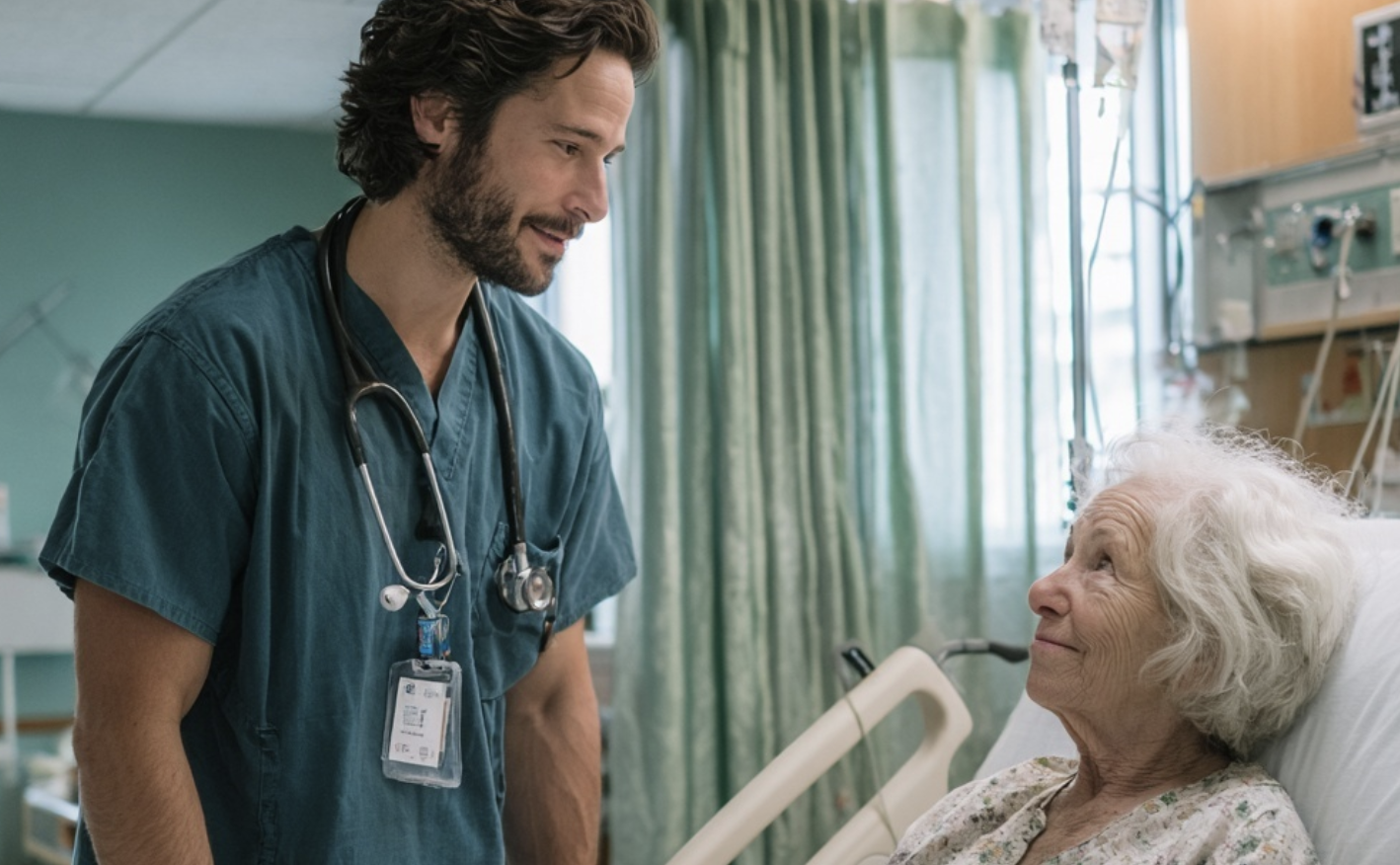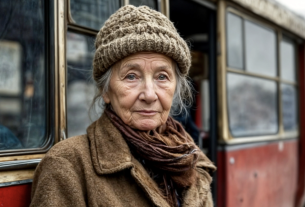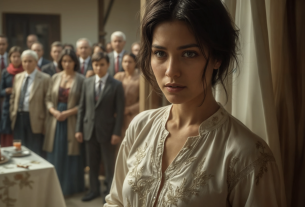Dima had wanted to become a doctor for as long as he could remember. It wasn’t just a childhood fantasy — it felt like his calling. Yet life seemed determined to block his path at every turn. First came the sudden death of his father, shattering the ground beneath his feet. Then his mother’s health began to fail; the nerves and endless grind of two jobs wore her down. When the time came to take the medical school entrance exams, Dima simply didn’t have the strength — and failed.
Now, for the second year in a row, he worked as an orderly at the regional hospital. He scrubbed floors, wheeled patients through echoing hallways, and ran errands from dawn till dusk. Still, deep inside, he nurtured the fragile hope that someday he’d earn the right to wear that white coat.
That day began like any other — mopping, cleaning, carrying. But after lunch, something unusual happened: the head of the therapeutic department, Andrey Pavlovich, sent for him.
“Dima, there’s a delicate matter,” the doctor began without preamble, studying him intently. “We have a patient — Lidiya Semyonovna. She’s very ill. She has a grandson, also named Dima. Only… she hasn’t seen him in years, and she wishes, more than anything, to see him one last time before she goes. We thought… maybe you could pretend to be him? For her peace of mind, if nothing else.”
Dima froze. Pretend? Deceive an elderly woman on her deathbed?
“Andrey Pavlovich, I… I’m not sure. Isn’t that wrong?” he asked quietly.
The doctor’s voice softened. “Sometimes a lie can be merciful. For her, it would be a final comfort. You wouldn’t be taking advantage — only helping someone leave this world with a little less pain.”
Dima hesitated. His conscience whispered that it was wrong, yet the thought of a frail woman waiting for her grandson gnawed at his heart. At last, he nodded. The nurses quickly filled him in: what the real Dima liked as a child, where he studied, the little phrases he used to say. The strange performance — with a single audience member — was set.
That evening, exhausted after his shift and the conversation with Andrey Pavlovich, Dima stopped by the store for bread and milk. His mother still needed him. On the way home, he unexpectedly ran into Marina, the girl from the neighboring building who had caught his eye long ago. Light-hearted, warm, with a smile that could brighten even the grayest day.
“Hi, Dima! Where have you been hiding?” she laughed.
They chatted easily — about nothing in particular, a new movie playing at the cinema. On impulse, Dima suggested they go together. To his amazement, Marina’s eyes lit up.
“Saturday? Perfect.”
As he walked home, a rare smile played on his lips. The mere thought of the date made the day feel brighter. Maybe this was the start of something new — maybe happiness wasn’t so far away after all.
The next day, after his shift, Dima changed into civilian clothes and cautiously stepped into Lidiya Semyonovna’s room. His heart pounded as if it might burst. What if she saw through him immediately? But the frail woman, tiny and thin yet with sparkling eyes, studied him and smiled faintly.
“Dimochka… you came, my dear…”
Relief washed over him. She believed. He sat beside her, and to his surprise, their first conversation flowed easily, almost naturally. He’d expected to feel like an actor on stage, but instead he found himself listening — really listening. Lidiya Semyonovna spoke about her life, about the past, even about death — with a serenity that humbled him.
Day by day, he visited more often. He brought her water, fluffed her pillow, or simply sat holding her hand. One afternoon she asked if he had a girlfriend. Dima thought of Marina and blushed. The old woman smiled knowingly.
“Tell me later how the date went. I still love hearing about young love.”
But Saturday didn’t unfold as he had hoped. After the movie, they strolled through the park when Marina suddenly grew serious.
“Dima, you’re a good guy. Really. But we’re different. I want to travel, build a career, see the world. And you… you’re an orderly. That’s important work, of course, but… not the life I want.”
She didn’t need to finish; he understood. His meager salary, his uphill battles, his uncertain future — all of it stood like an invisible wall between them.
He walked her home in silence. When he returned, his mother asked how it went. Dima just waved it off.
“Nothing came of it.”
She sighed. She had never approved of the “grandson” charade either.
“Dima, I know you wanted to help. But you can’t carry other people’s hopes and expectations on your shoulders forever. Some burdens just aren’t yours to bear.”
He sat in silence, hollow inside. Marina’s words were a sharp reminder of how far his life had drifted from his dreams, and his mother’s quiet reproach only deepened his guilt toward Lidiya Semyonovna.
The next day, Dima returned to the old woman’s bedside. He forced a smile, but she immediately saw through him.
“What’s wrong, grandson? Did that girl hurt you?” she asked gently.
And so he told her everything—about his dreams, his failures, how far he had fallen from the future he once imagined. Lidiya Semyonovna listened in silence, nodding, and then said:
“Love, Dimochka, comes in many forms. Don’t chase the one who only dazzles. You need the one who warms.”
Then she pulled an old, worn photo album from her bedside table.
“Take this. These are pictures of my son, Alexey—your father. Keep them. The memories belong to you now; I don’t need them anymore.”
Her voice trembled. Dima understood: this was a farewell, not just to her, but to part of his illusions.
That evening at home, he leafed through the album. A smiling young man looked out from the faded photographs—Alexey, the father he knew only from stories. Suddenly his eyes caught on one picture—a group shot from what looked like a university event. Among the faces stood a young woman with a radiant smile. Dima froze. It was his mother.
His breath caught. This couldn’t be a coincidence. His parents had known each other. But why had she never said a word? Why keep it a secret all these years?
Questions swirled through his mind. He needed answers now. He jumped up and rushed back toward home.
As he hurried out of the hospital, still unsure what he would say, a muffled conversation caught his ear near the doctors’ lounge. The door was ajar, and he recognized Andrey Pavlovich’s voice:
“…yes, we’ll increase the dose slowly—no one will suspect a thing. We’ll blame it on the illness getting worse. She has a nice inheritance, and that ‘official grandson’ of hers is already impatient for her to settle down.”
Then another voice crackled nastily over a speakerphone: “Just hurry it up, Pavlovich. I’m sick of waiting. That old woman’s time should have been over long ago.”
Dima’s heart pounded. A conspiracy! They were deliberately hastening her death—for money. His own grandmother, whom he had only just found, was in danger. Panic hit him like a wave, but there was no time for fear—he had to act.
He flew out of the hospital and stormed home. Bursting into the apartment, he shoved the photo at his mother.
“Mom, who is this?! Who is Alexey really?!”
She saw the picture and went pale. Then the words poured out like a dam breaking.
Alexey had been her first and only love. They were planning to marry, but his mother, Lidiya Semyonovna, had fiercely opposed their union. She believed her son deserved someone “better” than a poor girl from the outskirts.
When she became pregnant, Alexey wanted to protect her and suggested they leave. But tragedy struck—he died in an accident before Dima turned one. Left alone and penniless, she had no choice but to place her baby in an orphanage temporarily while she searched for work and the strength to rebuild her life.
She wrote to Lidiya Semyonovna, begging her to acknowledge her grandson, but the grieving, prideful woman never replied.
As Dima listened, the ground shifted beneath him. The woman in the hospital wasn’t just a lonely patient—she was his grandmother. And now someone wanted her dead.
“Mom, we have to save her,” he said, resolute.
Late that night, when the hospital was quiet, Dima and his mother slipped into Lidiya Semyonovna’s room. She was weak but alert.
“Dimochka… and who’s this with you?” she whispered.
“Lidiya Semyonovna… it’s me… Katya,” his mother’s voice shook. “Don’t you remember? I loved your Alyosha. And this is your real grandson—our Dima.”
In minutes, they spilled out the truth: their past, the conspiracy, the mortal danger. The old woman’s eyes filled with tears.
“My dear grandson… and you’re here, Katyenka…”
But there was no time for sentiment.
“Grandma, we need to leave. Now!” Dima urged.
They quickly packed a few belongings and gently helped her up. Hand in hand, they slipped out through the service exit where a taxi waited. All the way, Lidiya Semyonovna clutched Dima’s hand, afraid to lose him again.
That night was both chaotic and miraculous—a family, once broken by pride and tragedy, was made whole again.
Months passed. Thanks to a nurse Dima confided in, Andrey Pavlovich and his accomplice faced justice. Lidiya Semyonovna recovered slowly, surrounded by love in the small apartment of her daughter-in-law and grandson. For the first time in years, she felt warmth, care, and belonging. And for the first time, Dima truly understood what “family” meant.
Evenings became sacred: his grandmother’s stories about his father, old childhood photos, his mother’s laughter finally freed from secrets. The man in the photos—once a legend—felt alive again.
One evening, the phone rang. The screen lit up: Marina.
“Hi, Dima,” her voice was hesitant. “I was thinking… maybe we could meet?”
Dima smiled faintly. “Sorry, Marina, I’m busy. I have a different life now.”
And it was true. He had found someone who saw him for who he was—Katya, a kind medical student who asked for nothing but to stand by his side.
Around the family table, with tea steaming, his grandmother telling jokes, and Katya’s warm gaze meeting his, Dima finally felt it—real happiness.
No, he still wasn’t a doctor, and the white coat in his closet remained just a symbol. But now he understood: purpose isn’t a title or career; it’s the people who love you. And he had found his path—the path of family, faith, and truth.
He was no longer the lost boy he once was. He had grown, become strong and steady, ready to face each new day with hope, love, and an open heart.



